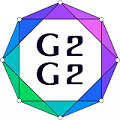It is not a coincidence that this event takes place in Slovenia. The first G2 event in 2014 came as a final success of numerous attempts to invite Klavdija Kutnar, Dragan Marušič and Tomaž Pisanski to visit Akademgorodok. They agreed, along with three of their colleagues, to travel to Russia which turned the event into a full scale workshop. It was supported by Alexander Mednykh and enjoyed a healthy number of Russian participants, including Sergey Goryainov and Natalia Maslova. The Slovenian participants made impressive talks and afterwards Sergey and Natalia asked why was there no regular algebraic graph theory conference in Russia of international scale.
As a response, the second G2 event was organized near Yekaterinburg with the valuable support of Vladislav Kabanov. At that moment the format of G2 meeting was set: a few lecture series and talks, both invited and contributed. The lecture courses were given by the three Slovenian mathematicians mentioned above and especial gratitude went to Tomaž Pisanski who explained how to write programs in Python and Sage. The next event, held in Akademgorodok, Novosibirsk in 2016, was of a truly international scale. In particular, the China-Japan-South Korea school of algebraic combinatorics was well-represented including invited speakers and graduate students. In a sense, this East Asian school of mathematics was founded by Eiichi Bannai and Tatsuro Ito. Tatsuro was one of the main speakers at the 2016 event, while Eiichi only joined last year. This particular event stimulated further cooperation between Russian and East Asian mathematicians and led to a healthy exchange of visits and more. It has become tradition that everyone that attends a G2 school tries their best not to miss further events.
The next event was held in Yekaterinburg in 2017 and was influenced by a number of participants of the Group Theory conference held in Novosibirsk a week before. By 2018, the G2-event has grown to a congress level thanks to the number of outstanding mathematicians from all around the world that attended as the main speakers and as course lectures. This includes Sergei Lando from the Higher School of Economics in Moscow (who is also expected to come to the 2020 meeting.) The prominent Chinese participants, including Yaokun Wu (who has been attending since 2016), Jiping Zhang and Shaofei Du, suggested to move the next event further eastwards to China. Thus the next G2-event was planned. The Chinese influence can be seen already at the 2018 event, whose proceedings were published as a special issue of Algebra Colloquium Journal based in China. The 2019 event took place on an even higher scale with more than 150 participants at the Three Gorges Mathematical Centre in Yichang. It was largely organized by Yaokun Wu, with participants from all continents with topics covering the whole of algebraic graph theory and its boundaries.
We very much hope that the current event will follow the strong tradition of G2-events built over the years. The tradition can be described by three main features: highest quality of mathematics, friendly cooperative atmosphere and a wide range of topics all connected by invisible links.
The list of previous summer schools held within the G2 series:
- Groups and Graphs, Designs and Dynamics (G2D2), Yichang, China, August 12–25, 2019
- Graphs and Groups, Representations and Relations (G2R2), Novosibirsk, Russia, August 06–19, 2018
- Groups and Graphs, Metrics and Manifolds (G2M2), Yekaterinburg, Russia, July 22–30, 2017
- Graphs and Groups, Spectra and Symmetries (G2S2), Novosibirsk, Russia, August 15– 28, 2016
- Groups and Graphs, Algorithms and Automata (G2A2), Yekaterinburg, Russia, August 09–15, 2015
- Graphs and Groups, Cycles and Coverings (G2C2), Novosibirsk, Russia, September 23– 26, 2014

